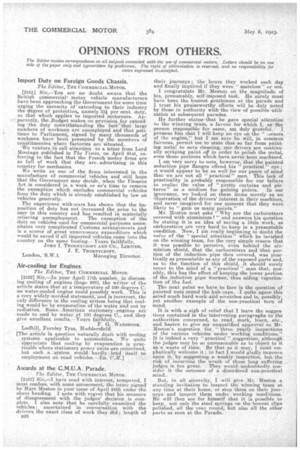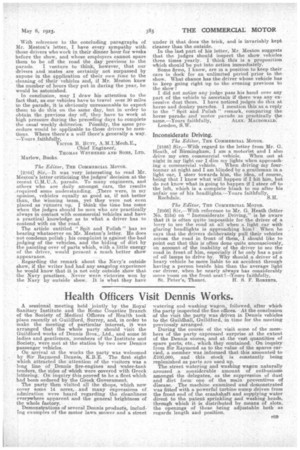OPINIONS FROM OTHERS.
Page 30

Page 31

If you've noticed an error in this article please click here to report it so we can fix it.
Import Duty on Foreign Goods Chassis.
The _Editor, THE COMMERCIAL MOTOR.
L2161] Sir,--You are no doubt aware that the British commercial, motor vehicle manufacturers have been'approaching the Government for some time urging the necessity of 'extending to their industry the degree of protection., namely 33* per cent. duty, as that which applies to imported motorcars. Apparently, the Budget makes,. no provision., for extending:the duty notwithBta,nding the fact-that large numbers of workmen are unemployed and that petitions to Parliament, signed by many thousands Qf workmen have been presented 'by the members of constituencies where factories are situated.
We yenture.to call attention to a letter from Lord Montagu published in The Times, on April 21st, referring to the fact that the French motor firms are so full of -work that they are advertising in this country for mechanics. We -write as one of the firms interested in the manufacture of commercial vehicles and still hope that the Government may decide, when the Finance Act is considered in a week or so's time to remove the exemption which excludes commercial vehicles from the duty which is already established by law on vehicles generally.
The experience with cars has shown that the imposition of duty has not increased the price to the user in this country and has resulted in materially relieving unemployment. The exemption of the duty on vehicles used for commercial purposes necessitates very complicated Customs arrangements and is a source of great unnecessary expenditure which would be saved if all imported vehicles came into the country on the same footing.—Yours faithfully,
JOHN I. THORNYCROFT AND CO., LIMITED, J. E. THORNYCROFT,
London,' S. W. 1. Managing Director..
Air-cooling for Engines.
' The .Editor, THE COMMERCIAL MoToa.
[2162] Sir,—In your April 17th number, in discussing cooling of engines (page 288), the writer of the article states that at a, temperature of 100 degrees C. no water-cooled engine could possibly work. This is a very widely-worded statement,' and is incorrect, the only difference in the cooling system being that cooling would be by evaporation of the water and not ioy radiation. Some American stationary engines are -made to cool by water at 100 degrees C., and.they give excellent results.--Yours faithfully, F. G. WARBROOK. Ludhill, Farnley Tyas, Huddersfield. [The article in question naturally dealt with cooling systems applicable to automobiles. We quite appreciate that cooling by evaporation is practicable where stationary power units are concerned, but such a system would hardly lend itself to employment on road vehicles.---En. C.M.] Awards at the C.M.U.A. Parade.
The Editor, THE COMMERCIAL MOTOR.
[2163] Sir,—I have read with interest, tempered, I must confess, with some amusement, the letter signed' by 'Marc Meston in your issue of April 24th under the above heading. I note with regret that his measure of disagreement with the judges' decision is complete. I also note that he carefully examined the vehicles; ascertained in conversation with the drivers the exact class of work they did; length of B28 their journeys; the hours they worked each day and finally inquired if they were " ma,teless" or not.
I congratulate Mr. Meston on the magnitude of his, presumably, self-imposed task. He surely must have been the busiest gentleman at the parade and I trust his praiseworthy efforts will be duly noted by those in authority with the view of possible utilization at subsequent parades.
He further states that he gave special attention to the winning team, a favour for which I, as the person responsible for same, am duly grateful.' I promise him that I will keep an eye on' the "corners of the engirie," but I am sure he will, in common fairness, permit me to state that so far from painting metal to save cleaning, our drivers are continually scraping paint off in order to polish the metal, even those portions which have never been machined.
I am very sorry to note, however, that the painted induction pipe flanges offend his " practical ' eye ; it would appear to be as well for our peace of mind thati we are not all " practical " men. This lack of practicality is probably responsible for our failure to realize the value of " pretty curtains and pictures" as a medium for gaining points, In our ignorance, we looked on these items merely as an illustration of the drivers' interest in their machines, and never imagined for one moment that they were likeiy to "gain us many points."
Mr. Meston next asks Why are the carburetters covered with aluminium ? " and answers his question by stating it is an idea of saving a little work, as carburetters are very hard to keep in a presentable condition. Now, I am really beginning to doubt the 'sable of the " special attention" which he lavished on the winning team, for the very simple reason that it was possible to perceive, even behind the aluminium. shield, that the carburetters and that portion of the induction pipe thus covered, was practically as presentable as any of the exposed parts and, as to the function of this shield, it should surely occur to the mind of a " practical " man that, possibly, this has the effect of keeping the lower portion of the induction pipe warmer, thus aiding vaporization of the fuel.
The next point we have to face isthe question of painted nuts round the hub caps. I quite agree this saved much hard work and scratches and is, possibly, yet another example of the non-practical turn of mind.
It is with a sigh of relief that I leave the suggestions contained in the intervening paragraphs to the authorities concerned, to read, mark, learn, etc., and hasten to give' my unqualified approval to Mr. Meston's sugestion for "three yearly inspections of the various vehicles under working conditions." It is indeed a very " practical " suggestion, although. the judges may be so unreasonable as to object to it RS a, waste of time. Be-that as it may, I most emphatically welcome it ; in fact I would gladly improve upon it, by suggesting a weekly inspection, but the risk of .incurring the wrath of those long suffering judges is too great. They would undoubtedly consider it the outcome of a disordered non-practical mind.
But, in all sincerity. I will give Mr. Meston a standing invitation to inspect the winning team at any time at their home, or stop them on their journeys and inspect them under working conditions. He will then see for himself that it is possible to keep. not only-the steel springs on the bonnet clips polished, all theyear round, but also all the other parts as seen at the Parade.
With reference to the concluding paragraphs of Mr. Meston's letter, I have every sympathy with those drivers who work in their dinner hour for weeks before the show, and whose employers cannot spare them to be off the road the day previous to the
parade. I venture to think, however, that our drivers and mates are certainly not surpassed by anyone in the application of their own time to the cleaning of their vehicles and, if Mr. Meston knew the number of hours they put in during the year, he would be astonished.
In conclusion, may I draw his attention to the fact that, as our vehicles have to travel over 30 miles to the parade, it is obviously unreasonable to expect them to do this on the same day, but in order to obtain the previous day off, they have to work at high pressure during the preceding days to complete the usual weekly deliveries. Possibly, the same procedure would be applieable to those drivers he mentions. Where there's a wail/ there's generally a way. —Yours faithfully,
VICTOR B. Burr, A.M.I.Mech.E., Chief Engineei, Tomas WETTIERED A311) SONS, LTD. Marlow, Bucks.
The Editor, THE COMMERCIAL MOTOR.
' [2]64] Sir,—It was very interesting to read Mr. Meston's letter criticising the judges' deciaien at the recent C.M.U.A. parade. To many engineers, and others who are daily amongst cars, the results .required some understanding. There were, in my opinion, vehicles equally as good as, if not better than, the winning team, yet they were not even placed as 'runners up. I think the time has come when the judges should be men who are practically always in contact with commercial Vehicles and have a practical knowledge as to what a driver has to contend with on the road.
The article entitled " Spit and Polish" has no bearing whatsoever on Mr. Meston's letter. He does not condemn polish ; his complaint is against the bad judging' of the vehicles, and the hiding of dirt by the painting over of parts which, with a little energy of the driver, would present a much better show appearance.
Regarding the remark about the Navy's outside show, if the writer had had any seagoing experience he would know that it is not only outside show that the Navy practises. Never were victories won by the Navy by outside show. It is what they have under it that does the trick, and. is invariably kept cleaner than the outside. In the last part of his letter, Mr. Meston suggests that the judges should inspect the show vehicles three times yearly. I 'think this is a proposition which should be put into action immediately.
Some firms' I know, are in a position to. keep their cars in dock for an unlimited period prior to the show. What chance has the driver whose vehicle has to keep going right up to the evening previous to the show t
I did not notice any judge pass his hand over any part of the vehicle to ascertain if there was any excessive dust there. I have noticed judges do this at horse and donkey parades. I mention this as a reply to the "Spit and Polish" remark, comparing the horse parade and motor parade as practically the same.—Yours faithfully, ALEX. MACDONALD. London, S.W.
Inconsiderate Driving.
The Editor, THE COMMERCIAL MOTOR.
[2165] Sir,—With regard to the letter from Mr. G. Heath, of Birmingham, I am a motorist and I also drive my own commercial vehicle. When. out at night in my light car I dim my lights when approaching a commercial vehicle. When driving my fourtonner at night and I am blinded by a gentleman in a light car, I steer towards him, the idea, of course, being that I know what Will happen if I hit him, but do not know what is going to happen if I steer off to the left, which is a complete blank to me after his unfair use of his headlights.—Yours faithfully, Rochdale. S.H.
The Flditor, THE COMMERCIAL MOTOR.
[2100] Sir,--With reference to Mr. G. Heath (letter. No. 2154) on "Inconsiderate Driving," is he aware that it is often quite impossible for the driver of a lorry to See the road at all when a light car with glaring headlights is approaching him When he says that the drivers deliberately pull their vehicles across the road in front of them, I should like to point out that this is! often. done quite unconsciously, on account of the inability of the driver to see the road in front of him, especially if he only has a pair of oil lamps to drive by. Why should a driver of a heavy vehicle be more liable to an accident. through having a person beside him than the average light car driver, when he nearly always has considerably more 'room on the front aeatl—Yeurs faithfully,
St. Peter's, Thanet. IL S. F. ROBERTS.


































